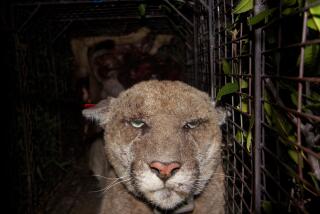Concerned Pet Owners Trigger a Delay in Squirrel Eradication
- Share via
After complaints from pet owners, the Orange County Agricultural Commission has prohibited a pest control company from using a poison bait to kill squirrels along a stretch of the Santa Ana River Trail in Huntington Beach unless special boxes are used to ensure that dogs and cats can’t get in them.
Owners reported no illnesses in their pets, but many took exception that the company had been putting the chemically treated pellets where pets could reach them.
Huntington Beach resident Merrilee Madrigal said the use of the poison, diphacinone, has worried hundreds of residents, judging from the more than 200 e-mail responses logged at a community chat room.
She said not only are people worried about walking their dogs, but they fear that the dead squirrels will transmit disease.
She said she posted an Internet message after she noticed a workman putting out pellets Wednesday on the trail’s west bank, near Le Bard Park.
The worker did not post signs warning pet owners, she said. Steve Hill, a deputy county agricultural commissioner, said the company is not required to, under its contract. Madrigal said she posted her own warning signs last week.
Other residents expressed concern that wild creatures such as rabbits, coyotes and birds could ingest the pellets or eat the decaying carcasses and spread disease.
The county hired Pest Options, an Anaheim company, to control the squirrel population, said Jim Dourte, a spokesman for the county’s public works agency. Squirrel control is necessary, officials said, because the rodents can dig tunnels that weaken river embankments.
The company has stopped its work until the county commission finishes looking into the controversy, with a report to follow.
Dourte said he didn’t see any dead squirrels when he visited the trail Thursday to inspect the area after the county received complaints. He said the contractor was supposed to pick them up each day.
Bryan Thompson, a spokesman for Pest Options, said the company had been placing the rodenticide where there were squirrel burrows.
Rodents must ingest the poison, which prevents blood clotting, for five consecutive days to get a fatal dose.
Hill said diphacinone is “relatively safe and is non-toxic” to non-rodent pets unless they ingest a large amount.
Two years ago, state officials banned diphacinone for killing rabbits in urban settings. Companies can use their remaining inventories of the poison, however. The problem is that pets and birds of prey could eat the rabbits and thereby ingest the poison.
In 1983, an El Nino year, the county was held responsible in a civil trial for the failure of an earthen levee that left two Huntington Beach mobile home parks flooded. Instead of being lined with concrete, the levee was made of soil and riddled with gopher holes. The county is worried that squirrels could cause a similar problem along the Santa Ana River. The river is concrete-lined, but the soil supporting it could be undermined.
Also, if the squirrels die or abandon their tunnels, larger animals such as foxes, skunks and ground owls can move in, enlarging the holes and thus further weakening the embankment.
More to Read
Sign up for Essential California
The most important California stories and recommendations in your inbox every morning.
You may occasionally receive promotional content from the Los Angeles Times.













